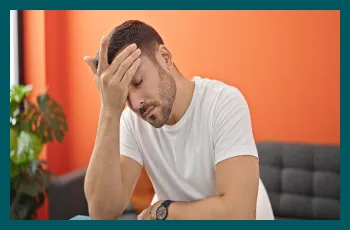When a woman shuts down emotionally? A therapist's explanation.
Written by editorial staff writer at Hola. Medically reviewed by Amira Shah, MA in Counselling Psychology, Registered Psychotherapist. Originally published on 14 Oct 2024. Blog updated on 27 March, 2025.

Contents

Overview
When a woman shuts down emotionally, it often stems from feeling overwhelmed, unheard, or emotionally unsafe. According to therapists, this can be a protective response to prolonged stress, unresolved conflicts, or emotional exhaustion. Signs include withdrawal from conversations, a lack of emotional expression, and difficulty connecting with others. Rebuilding emotional openness requires patience, trust, and support. Encouraging open communication, validating her feelings, and creating a safe space for expression can help. If emotional shutdown persists, therapy can provide deeper insights and strategies to process emotions in a healthier way. Imagine a woman who usually brightens the atmosphere, and suddenly becomes silent, retreating into her shell at the first hint of conflict. Emotional shutdown can feel like turning off a light—in one moment, she is vibrant and communicative, and in the next, she is a barricade of feelings, completely sealed off. Understanding the reasons behind women's emotional withdrawal leads to deeper understanding, enabling them to reestablish a connection with their emotions and confront life's challenges more effectively.What is emotional shutdown?
Disconnecting from emotions to prevent distress is known as emotional shutdown. It may show up as withdrawal from emotional interactions, avoidance, or numbness. The individual suppresses or ignores their emotions instead of processing them, which results in a lack of emotional responsiveness. Women may experience emotional shutdown as a reaction to ongoing stress, toxic relationships, burnout at work, or trauma from the past. It is frequently misinterpreted as coldness or indifference, but it indicates that the person is having internal difficulties.Women’s mental health in Australia: A scenario
In Australia, women's mental health presents a complex landscape marked by both challenges and resilience. 1 in 5 (20%) females aged 16–85 experienced a mental disorder in the past year, not 25% as previously stated. These statistics highlight the pressing need for targeted mental health support and interventions across different life stages. Mental health services in Australia offer support through therapy, helplines, and community groups. Telehealth in Australia assist in fast check-ins with a GP online, including after-hours doctor consultations, mental health plans at zero cost, medical certificate for mental health struggles and scripts online. However, in-clinic barriers such as long wait times for appointments, financial constraints, and societal stigma can make it difficult for women to access help when they need it most.Risks of emotional shutdown in women
Neglecting emotional distress can have detrimental long-term impacts on one's physical and mental well-being. Shutting down emotionally can result in:- Chronic anxiety or depression: Chronic anxiety or depression can result from suppressing emotions, which can cause them to worsen over time.
- Relationship tension: Emotional disengagement can lead to miscommunications, disputes, and separation.
- Physical health problems: Unresolved stress can lead to immune system weakness, headaches, stomach troubles, and insomnia.
- Low self-esteem: Women who experience emotional shutdown may lose confidence because they feel cut off from who they are.
- Communication problems: It is more difficult to express needs and concerns when emotions are suppressed, which makes conflict resolution challenging.
What makes a woman shut down emotionally?
Several factors can trigger emotional shutdown in women, including:Past trauma
Some past traumas, such as abuse or neglect, may emotional detachment as a defence mechanism. Avoiding emotions helps prevent reliving painful experiences, and some women may unconsciously choose this route.Persistent stress
Juggling work, family, and personal responsibilities can be exhausting. If a woman feels unsupported or lacks healthy coping mechanisms, she may shut down to cope with the pressure.Toxic relationships
Being in a relationship where emotional needs are dismissed or invalidated can cause emotional withdrawal. A woman might stop expressing feelings if she fears criticism or rejection or further emotional harm.Workplace pressure and burnout
Work stress, gender inequality, and lack of work-life balance can push women into emotional exhaustion. Many women feel the pressure to "hold it together" in male-dominated workplaces, leading to emotional suppression.Fear of vulnerability
Some women learn from a young age that showing emotions is a weakness. They may have been taught to be "strong" or "resilient" at the cost of ignoring their true emotions.Certain mental health conditions
Underlying mental health conditions can contribute to emotional shutdown. Women experiencing depression, anxiety or post-traumatic stress disorder (PTSD) may struggle to access or express emotions due to ongoing psychological distress.Ready to access mental health support? Consult a GP to discuss your eligibility.
Signs a woman is shutting down emotionally in a relationship
Here are 10 signs that a woman may be shutting down emotionally in a relationship:
- Reduced communication: She talks less about her emotions and avoids expressing personal views.
- Emotional distance: There is a clear distance or lack of emotional connection. American psychologist and Stanford professor James Gross believes that suppressing emotions leads to internal conflict that often overflows, impacting everyone, including partners, friends, and loved ones.
- Avoidance of physical contact: Hugs, kisses, and other physical signs of affection decrease.
- Indifference: She expresses little interest in the relationship or her partner’s demands.
- Avoiding conflict: Prefers silence or withdrawal rather than discussing needs.
- Lack of effort: Stops attempting to settle disputes or sustain a relationship.
- Increased time alone: Spends more time alone or away from their partner.
- Changes in behaviour: Behavioural changes include sudden mood swings or emotional isolation.
- Disengagement from activities: Losing interest in common hobbies or activities.
- Constant exhaustion: She seems emotionally exhausted, frequently weary or indifferent.
When does a woman withdraw emotionally?
When a woman withdraws emotionally, it may be a reaction to feeling neglected, unheard, or emotionally exhausted in a relationship. The retreat might occur due to ongoing unfulfilled needs or unresolved issues, leading her to no longer feel secure or valued. It might also be a result of feeling overwhelmed by life pressures, worry, or uncertainty in the relationship. Emotional disengagement may be her method of shielding herself from more pain or disappointment. Signs include less communication, a lack of desire to spend time together, avoidance of confrontation, and a general alienation from intimacy.
Coping with emotional shutdown
Overcoming emotional shutdown takes time and self-awareness, but there are effective strategies to reconnect with emotions:
- Acknowledge: The first step is recognising that emotional shutdown is happening. Understanding that it is a protective response can help women approach their feelings with self-compassion.
- Seek professional help: Therapy can be a powerful tool for working through emotional detachment. In Australia, Medicare covers mental health care plans that provide subsidised sessions with psychologists. Telehealth services also offer accessible, fully bulk-billed mental health care plans for those needing immediate support.
- Process emotions safely: Writing in a journal, creating art, or talking to a trusted friend can help process emotions in a safe way. Small steps, like naming emotions or writing down feelings, can gradually break the cycle of suppression.
- Self-care is important: Taking time for self-care is essential. Whether it’s practising mindfulness, exercising, or setting boundaries with draining relationships, prioritising emotional well-being is key.
- Personal connections: Building strong connections with understanding friends or support groups can help women feel safe enough to open up.
- Regulate emotions healthily: Instead of shutting down, finding ways to manage stress, such as meditation, deep breathing, or guided relaxation, can help women regulate emotions in a healthy way.
- Don’t fall for stereotypes: Changing the mindset that emotions are “weak” can help women embrace their feelings as part of being human. Recognising emotions as valuable rather than burdensome can reduce the tendency to suppress them.
How to help?
You may consider these strategies to help a woman who might be withdrawing emotionally:
- Open communication: Provide a secure area to share her feelings without being judged. Listen actively and empathise.
- Be supportive: Validate her emotions and tell her you’re there for her.
- Address issues: Work together to overcome any underlying disputes or problems in your relationship.
- Give her space: Allow her to analyse her feelings without rushing to a conclusion.
- Seek Professional Help: Hola Health's Mental Health Care Plan provides thorough assistance via online meetings with qualified professionals, aiding individuals in tackling emotional difficulties like withdrawing from relationships. The care plan includes personalised therapy sessions, tailored treatment plans, and regular check-ins to monitor progress. Patients can also access counselling services for relationship issues, stress, anxiety, and self-esteem improvement.
So, emotional shutdown in women is like a suspenseful break in a story—often intriguing, but sometimes a signal that something more profound is at play. By fostering a secure atmosphere and offering resources for self-expression, we can restore the intensity of their feelings. Ultimately, accepting vulnerability goes beyond emotion; it’s about regaining power and recognising the inner strength that exists. After all, life is too short to remain in the shadows when there is so much joy to be experienced.
Providing consult for
- Cough
- Nausea & vomiting
- Fever
- Hayfever
- Fatigue
- Sore throat
- Acne
- Gout
- Eczema
- Rosacea
- Sunburn
- UTI
- Erectile dysfunction
- Contraception
- Morning sickness
- Morning after pill
- Prostate health
- Anxiety
- Depression
- Stress
- Grief & loss
- Premature ejaculation
- Asthma
- Blood pressure
- Diabetes
- Cholesterol
- Migraines & headaches
- Allergies
- Heartburn & reflux
- Sleep disorder
- Gastro
Related Articles
What Is Online Therapy? Everything You Need To Know About e-Therapy
Disclaimer
This blog is for general informational purposes only and does not indicate that Hola Health provides all treatments or preventive measures mentioned. It is not intended to be a substitute for professional medical advice. Always seek the guidance of your doctor or other qualified health professional with any questions you may have regarding your health or a medical condition. For emergencies please immediately contact 000. Any medical topics discussed are intended to educate, not to imply availability through Hola Health.




